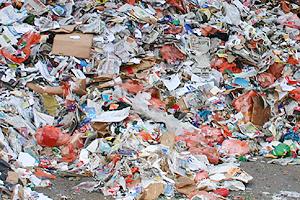And, a further 32,000 tonnes (2.46%) were refused at the gate of the recycling reprocessor – making a total of 121,000 tonnes (9.3%) of material which was not recycled.
The information could fuel opposition to commingled collections, which a number of UK reprocessors are already against (see letsrecycle.com story).
The figures were quoted on Friday by Defra's minister for waste and climate change, Joan Ruddock, in response to a question from Jessica Morden, Labour MP for Newport East.
Ms Ruddock said: “During 2006-07, the latest complete validated data available, local authorities reported a total of 89,000 tonnes collected for recycling from household sources as rejected at a materials recycling facility and a further 32,000 tonnes that were rejects at the gate of a recycling processor.
“Of the 89,000 tonnes of municipal waste collected for recycling in 2006/07 and rejected at a materials recovery facility, 55,000 tonnes were sent to landfill and nearly 34,000 tonnes were sent for incineration with energy recovery,” she added.
WRAP
Responding to the question of what the government was doing to tackle the problem and “maximise the proportion of recovered materials that reach end processors in a clean state”, Mrs Ruddock said that a number of factors affected the quality of material.
However, she pointed towards the work of WRAP which is currently producing a report into the performance of materials recycling facilities and has already dubbed the performance of the sorting facilities as “variable” (see letsrecycle.com story).
She said: “A number of factors determine the quality of recyclable materials, including market price, source and methods of collection and separation. The Government provides support and advice on recycling to businesses and local authorities via the Defra-funded Waste and Resources Action Programme.”
Deposit
On Friday, Mrs Ruddock also commented on the possibility of a national deposit system for drinks containers to encourage the public to return them to where they were bought from, and thereby increase recycling.
This follows lobbying by the Campaign to Protect Rural England for a new bottle deposit law, in which consumers would pay 10p extra to buy drinks, which would then be refunded when they returned the container.
The charity claims that while the average household disposes of 500 plastic bottles a year, only 130 are currently recycled, meaning that 370 go to landfill or create litter.
Responding to a question raised by David Kidney, Labour MP for Stafford, Mrs Ruddock said that the government would look at deposit schemes as one of a “range of ideas to improve the collection of material for recycling, including drinks containers consumed inside and outside of the home.”
However, she pointed out that such schemes had been unsuccessful in the past because they were uneconomic.
She said: “Any solutions have to make both environmental and economic sense if they are to be successful. In the past, deposit and return schemes have been phased out in this country because they did not make financial sense for the operating companies.
“We would only support the re-introduction of such systems if they delivered environmental benefits in a practical and cost-effective way”, she stressed.












Subscribe for free